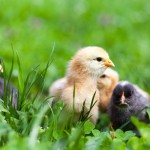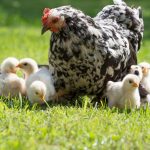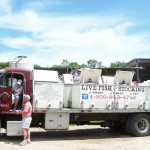Most flock raisers will tell you there’s something special about walking to the backyard and grabbing a few eggs for breakfast. In the ‘pets with benefits’ equation, farm fresh eggs are protein-packed gifts that families across the country have come to love.
The magic behind each farm fresh egg is a 24-26 hour process, with much of the work happening overnight.
The biggest involvement for the hen is creating the egg shell. The shell defends the yolk from bacteria and keeps the chick or yolk safe. Because of this importance, hens spend much of the process making sure the calcium-rich shell is strong and protective. When the lights are off and the hens are sleeping, that’s when most of this internal work happens.
The fact that shells are created at night is clear when looking at the egg formation timeline. For example, if a hen started the process at 7 a.m., she would be creating the egg shell, starting around 12 p.m. and continue for 20 hours during the evening and through the night when the birds are not eating.
Through this entire process, hens incorporate nutrients from their feed into the egg and shell. For instance, hens offered a nutritionally-complete feed with calcium, like Purina® Layena® Premium Poultry Feed or Purina® Organic Layer Feed, can lay eggs with vibrant, yellow yolks with strong shells. The addition of flaxseed meal in Purina® Layena® Plus Omega-3 can help hens produce eggs with high levels of valuable omega-3 fatty acids.
Following is an approximate outline of the egg production process:
Ova release (1/2 hour): Each female chick is born with thousands of immature yolks, known as ova. Over time, the ova mature. When the first ova is developed and ready to start the egg production process, it is released into the hen’s reproductive funnel. This release takes about half an hour.
Initial egg white is created (3 hours): As the egg enters the reproductive tract, the egg white begins formation, starting with a clear, protective yolk casing called the vitelline membrane. As the ova enters the magnum, layers of thick and thin proteins, known as the albumen, begin forming, creating the egg white.
Egg shape is formed (1 hour): The developing egg then travels to the isthmus. Here, the ova is shaped into the oval-shape recognized as an egg, a process that takes about one hour. The inner and outer membranes are also formed during this stage.
Shells are formed (20 hours): The most significant piece of the egg formation process happens in the uterus or ‘shell gland’ of the hen. The developing egg spends about 20 hours in the shell gland, where the shell is formed and its color is added during the last 5 hours.
The shell formation takes the most amount of time to complete.
Egg shell formation requires very high levels of calcium. If the hen does not have the nutrient to support shell production, she may pull the calcium from her specialized (medullary) bones to support shell formation. To support egg shell formation, select a complete layer feed that includes Oyster Strong™ System, like Purina Layena® Plus Omega-3 or Purina Layena® Pellets or Crumbles. This added ingredient provides slow-release calcium, helping to supply calcium to hens at night, when they need it most.
Once the shell is formed, pigments, called porphyrins, are secreted from cells within the uterus to add color to the egg shells. Chickens that produce eggs with white shells do not produce any of these pigments.
Bloom is added and egg emerges (1 hour): The formed egg travels to the vaginal area where bloom is added to the shell. Bloom, or the cuticle, is a protective coating that helps protect the egg from bacteria. A natural lubricant is also added to the shell for a safe exit through the cloaca.
After laying the egg, the hen will either start the process again or take a day off after completing a clutch of eggs. To help the process go smoothly and keep hens healthy and productive, a quality ration is important. After all, the formation of nutritious eggs is contingent on what the birds eat.



